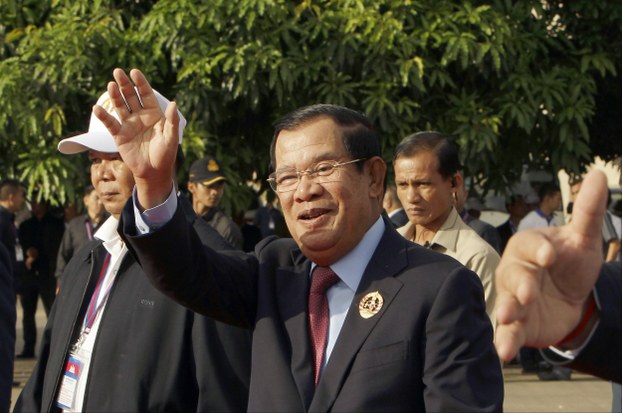




Cambodian Prime Minister Hun Sen Friday reiterated that he is not concerned with the possibility of losing duty-exempt status for the country’s products in the European market under the Everything But Arms (EBA) scheme.
The prime minister made the remarks while speaking to a group of Cambodian supporters in Brussels, echoing sentiment he expressed several times over the past year after the EU, concerned about the human rights situation in Cambodia, threatened to rescind EBA status.
“I have more concerns over ineffective government officials than losing EBA,” said Hun Sen.
During the event, the prime minister warned the Europeans that any attempt to eliminate EBA status for Cambodia would backfire.
“They must understand that what they have done for us in the past will be wasted just like salt dissolving in the water,” he said.
“[Lifting the EBA], means they also kill the opposition,” he said.
Hun Sen said the world must not use economic sanctions to influence politics, pointing out that this is precisely why there are a few countries that have refused EBA status, but without saying which countries did so.
While the rhetoric fits his previous statements on EBA, it contradicted a statement Hun Sen made at a global trade forum earlier this week.
During his address at the 2019 Global Review of Aid for Trade, held at World Trade Organization (WTO) headquarters in Geneva on Wednesday, the prime minister spoke against the initiative to lift trade preferences against developing countries like Cambodia, saying such a move would inhibit development.
In an interview with RFA’s Khmer Service, political analyst Kim Sok said that that the international community has no intention of harming Cambodia’s development efforts by rescinding EBA status, adding that he believes it is Hun Sen’s regime that’s destroying Cambodia.
“What the international community has done is [with the intention of] helping Cambodia,” said Kim Sok.
“[The EU] aren’t saying Hun Sen needs to sell out his sovereignty. He only needs to make reforms toward democracy,” said Kim Sok.
Cambodia’s slide into an effective one-party state began when authorities arrested opposition Cambodia National Rescue Party (CNRP) president Kem Sokha in September 2017 on charges of “treason” and then dissolved the CNRP and banned 118 of its elected officials from politics two months later for its alleged role in a plot to overthrow the government.
The EU’s threat to remove trade benefits came in response to the wider crackdown by Hun Sen on the political opposition, NGOs, and the independent media that paved the way for his ruling Cambodian People’s Party (CPP) to win all 125 seats in parliament in the country’s July 2018 general election.
Meanwhile, about 100 members of the Cambodian diaspora in France, Italy and Switzerland gathered in Geneva to protest against Hun Sen on Friday.
Lim Kanika, a youth leader for the CNRP said the protest was to show the world that Cambodians don’t accept what Hun Sen has done so far in terms of human rights and democracy.
“People want the Cambodian government to release Kem Sokha and restore the opposition party,” she said, referring to one of the party’s leaders who is currently under de-facto house arrest.
Reported by RFA’s Khmer Service. Translated by Samean Yun. Written in English by Eugene Whong.